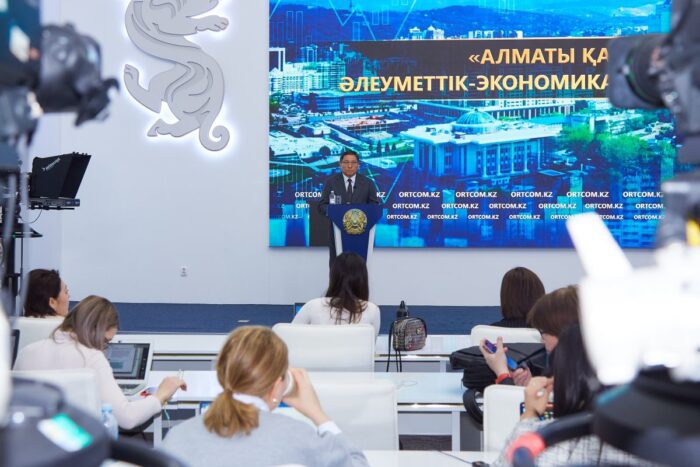ASTANA — Almaty attracted a staggering 1.5 trillion tenge ($3.2 billion) in investments in 2023, marking a remarkable 19.9% increase, announced Almaty Mayor Yerbolat Dossayev during a Dec. 21 press briefing at the Central Communications Service.

Almaty Mayor Yerbolat Dosayev during a Dec. 21 press briefing at the Central Communications. Photo credit: Central Communications Service.
Private investment growth exhibited even more impressive numbers, accelerating to 30.3%, highlighting the city’s appeal as a hub for business and economic activities.
Dossayev underscored a notable shift in the investment landscape, emphasizing a qualitative change in the structure of investments. Notably, the IT sector saw a remarkable surge of 7.3 times, healthcare grew by 3.7 times, manufacturing industry by 19.2%, and tourism by two times.
Fitch Ratings reaffirmed Almaty’s credit rating at the “BBB” level with a “Stable” outlook on Dec. 8, citing the city’s high investment activity and dynamic economic development. Over the first 11 months of 2023, Almaty’s short-term economic indicator witnessed a robust growth of 13%, with the manufacturing industry emerging as a key driver, experiencing an impressive growth rate of 17.7%.
The Almaty Mayor provided additional positive indicators for the city’s economic health.
“In November, annual inflation slowed to 10.5%. The situation on the labor market is improving, with 79,500 jobs created, of which 80% are permanent,” he said.
Looking ahead, Dossayev projected a further acceleration of economic growth, reaching 6.5% by the end of 2023, leading to a Gross Regional Product (GRP) per capita of $21,200. He highlighted the pivotal role of small and medium-sized enterprises (SMEs) in Almaty’s economic landscape, expressing expectations that their contribution to the city’s economy would increase to 60% in 2023.
“Supporting SMEs is one of the main priorities, playing a special role in the economy and employment of Almaty residents,” Dossayev said.
According to him, to bolster the manufacturing industry, Almaty is actively pursuing the construction of 18 small industrial parks covering 88,000 square meters, with a total investment of 10.2 billion tenge ($22.2 million). This initiative is expected to generate 2,000 new jobs, further contributing to the city’s economic growth.
